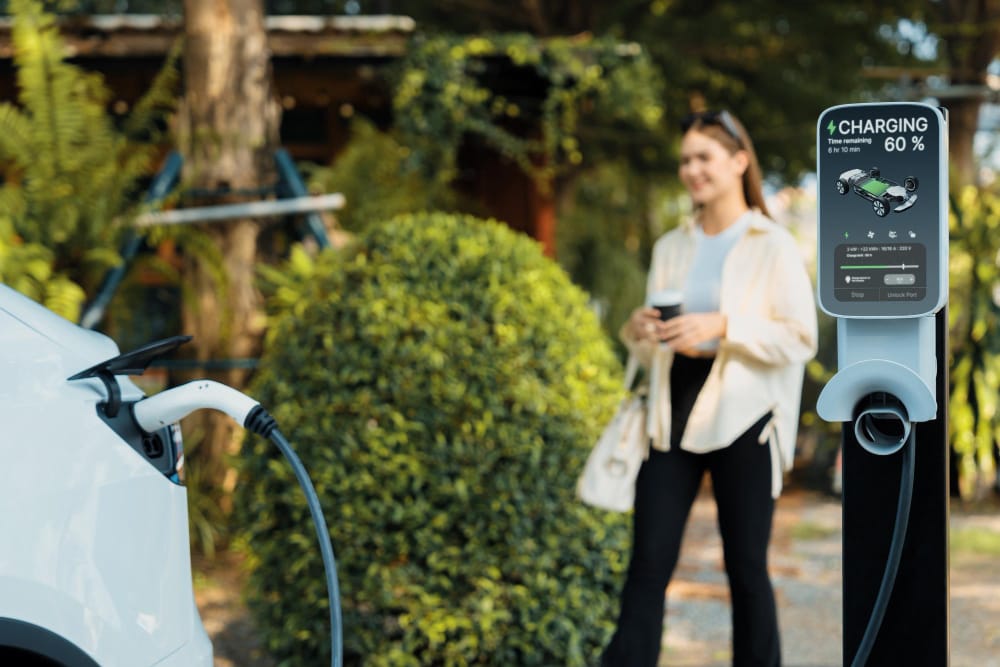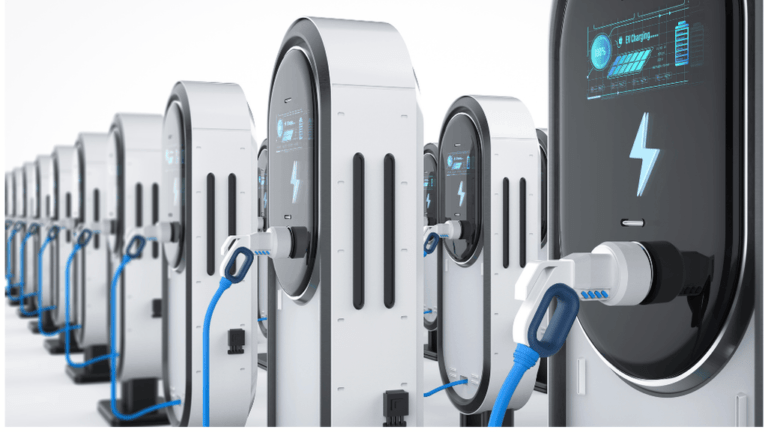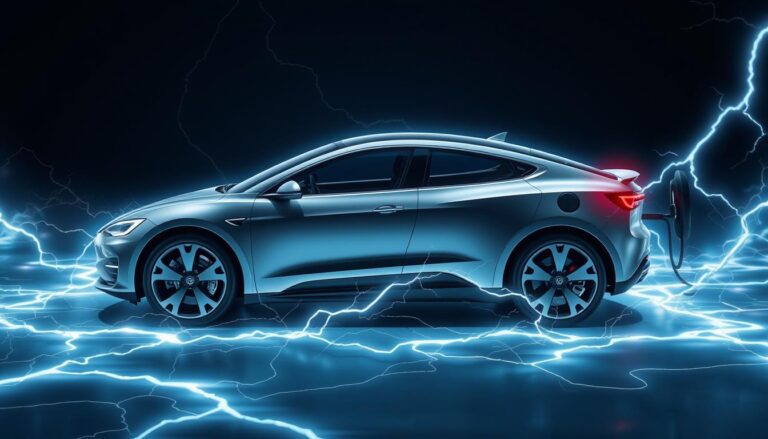As electric vehicles (EVs) become more popular, more people are thinking about switching from gas cars to electric cars. EVs promise lower fuel costs, less environmental harm, and cutting-edge technology. But, it’s important to know the good and bad sides of electric cars before jumping in.
This article will cover the main pros and cons of electric cars. We’ll look at energy efficiency, sustainability, performance, range, charging, costs, and savings. This will help you decide if an electric vehicle fits your life, budget, and needs.
The transport sector uses about 30% of U.S. energy and 70% of petroleum. Switching to electric cars could greatly cut our fossil fuel use. But, we must think about battery tech limits, charging setup, and EVs’ higher starting cost compared to gas cars.
We’ll check out different electric vehicles, like all-electric cars and plug-in hybrids. We’ll see their good points and downsides. Plus, we’ll talk about how efficient EVs are, with some models going 100 miles on just 25–40 kWh.
By the end, you’ll know the good and bad of electric cars. This will help you decide if an EV is right for you. So, let’s get into the exciting world of electric vehicles!
Key Takeaways
- Electric vehicles offer significant fuel cost savings, with the average driver saving between $1,500 to $2,000 per year compared to gas-powered cars.
- EVs have higher upfront costs but provide long-term savings through reduced fuel expenses and available tax incentives.
- Driving range and charging infrastructure are key considerations when choosing an electric car, with models offering anywhere from 100 to 400 miles per charge.
- Electric cars have a lower environmental impact, with the potential to reduce carbon dioxide emissions by 4.6 metric tons per year compared to traditional vehicles.
- While battery replacement costs can be a concern, prices have decreased significantly in recent years, and many manufacturers offer extensive warranties.
Introduction to Electric Vehicles
In recent years, electric vehicles (EVs) have become more popular as a green way to travel. More people are choosing EVs to help fight climate change and reduce air pollution. Thanks to better battery technology and more government support, electric cars are becoming more common.
What are Electric Cars?
Electric cars use an electric motor instead of a traditional engine. They run on rechargeable batteries that power the motor. Unlike cars with gasoline engines, electric vehicles don’t produce any emissions, making them a greener choice for getting around.
Types of Electric Vehicles
There are different kinds of electric vehicles, each with its own benefits:
- All-electric vehicles (AEVs): These cars run only on batteries and don’t have a gasoline engine. They make no emissions. Examples include the Tesla Model 3 and the Nissan Leaf.
- Plug-in hybrid electric vehicles (PHEVs): These cars have both an electric motor and a small gasoline engine. You can plug them in to charge the battery, letting them use electricity for a while before switching to the gasoline engine. The Chevrolet Volt and the Toyota Prius Prime are examples.
- Hybrid electric vehicles (HEVs): HEVs use both an electric motor and a gasoline engine. The electric motor helps the engine when you speed up and at low speeds. This makes them more fuel-efficient than regular gasoline cars. The Toyota Camry Hybrid and the Honda Accord Hybrid are examples.
| Electric Vehicle Type | Key Features | Examples |
|---|---|---|
| All-electric vehicles (AEVs) | Powered solely by rechargeable batteries, zero emissions | Tesla Model 3, Nissan Leaf |
| Plug-in hybrid electric vehicles (PHEVs) | Combine electric motor and internal combustion engine, can be plugged in to charge | Chevrolet Volt, Toyota Prius Prime |
| Hybrid electric vehicles (HEVs) | Use both electric motor and internal combustion engine, improved fuel efficiency | Toyota Camry Hybrid, Honda Accord Hybrid |
As more people want to use sustainable transportation, the choices of electric vehicles keep growing. This gives buyers many options to fit their needs and likes.
Energy Efficiency of Electric Cars
Electric vehicles (EVs) are much more energy efficient than cars with gas engines. EVs use advanced technology that turns a lot of potential energy into actual energy for the vehicle. Fueleconomy.gov says EVs use 59 to 62 percent of potential energy for movement. Gas cars only use 17 to 21 percent.
Comparing Energy Efficiency of EVs and Gas-Powered Cars
EVs and gas cars have a big difference in energy use. EVs can go 100 miles on 25 to 40 kWh of electricity. That means they can go about 43 miles for $1.00. A gas car with 22 miles per gallon can only go around 10 miles for the same price.
| Vehicle Type | Energy Conversion Efficiency | Miles Traveled per $1.00 |
|---|---|---|
| Electric Vehicles (AEVs) | 59 – 62% | ~43 miles |
| Gas-Powered Vehicles | 17 – 21% | ~10 miles |
Battery Technology and Energy Conversion
EVs are more efficient thanks to better battery technology and electric motors. These motors change over 85 percent of electrical energy into mechanical energy. Gas engines only manage about 40 percent efficiency.
EVs also use energy from the grid more wisely. About 59 to 62 percent of the grid’s energy goes to moving an EV. Gas cars use only 17 to 21 percent of the energy from fuel for movement. As batteries get better and more renewable energy is used, EVs will get even more efficient and eco-friendly, as experts at EVNextGen explain.
Environmental Impact of Electric Cars
Electric vehicles (EVs) are getting more popular because they can cut down on greenhouse gas emissions. This helps fight climate change. It’s key to know how electric cars affect the environment compared to traditional cars.
Reduced Emissions and Carbon Footprint
Electric cars are great because they don’t emit harmful pollutants like gas cars do. They don’t release carbon dioxide, nitrogen oxides, or particulate matter. This means cleaner air and a smaller carbon footprint.
A study by the International Council on Clean Transportation (ICCT) found EVs in the U.S. emit 60-68% less than gas cars over their life. Even including emissions from making EVs and the electricity they use, they’re still better for the planet.
Big car companies are setting goals to make fewer gas cars and focus on electric ones:
- General Motors plans to stop selling gas cars and trucks by 2035 and go all battery-powered.
- Volvo wants to have an all-electric lineup by 2030.
Renewable Energy Sources for Charging EVs
Charging electric cars with clean energy like solar or wind power makes them even better for the planet. As more energy comes from clean sources, EVs will keep getting greener.
| Energy Source | Percentage of U.S. Electricity Generation |
|---|---|
| Fossil Fuels (Natural Gas and Coal) | 61% |
| Renewable Energy | 39% |
More renewable energy means electric cars will have a smaller environmental impact. Governments and people can help by investing in clean energy and policies that support it.
In summary, electric cars are a key to reducing greenhouse gas emissions and making transportation greener. They have fewer emissions, a smaller carbon footprint, and can run on renewable energy. This makes them a big step towards a cleaner future.
Performance and Maintenance of Electric Vehicles
Electric vehicles are known for their great performance and low upkeep. They give a thrilling yet efficient drive. This makes them a top pick for those wanting fast cars that are also good for the planet.
Quiet and Smooth Operation
Electric cars are famous for their quiet and smooth ride. They make less noise and vibrate less than cars with traditional engines. This means a quieter and more comfortable drive.
When you hit the gas, electric cars speed up fast and smoothly. They don’t need shifting gears like traditional cars do. This makes driving them feel more exciting and easy.
Responsive Motors and Good Torque
Electric vehicles have motors that respond quickly and deliver strong torque. This means they accelerate fast and feel lively. They’re more agile and fun to drive, especially in city traffic and tight spots.
Lower Maintenance Requirements
Electric cars need less maintenance than cars with traditional engines. They have fewer parts that can break or wear out. This means they cost less to keep up and you won’t visit the mechanic as often.
| Maintenance Item | Electric Vehicles | ICE Vehicles |
|---|---|---|
| Oil Changes | Not Required | Required |
| Brake Wear | Reduced due to Regenerative Braking | Regular Wear |
| Engine Tune-ups | Not Required | Required |
| Fuel System Maintenance | Not Required | Required |
A study by Consumer Reports found that electric cars can save owners $1,800 to $2,600 on costs over 15,000 miles. Following the car maker’s maintenance advice, electric car owners might spend half as much on upkeep as ICE car owners.
Many electric cars also come with digital features. These let owners check and control their car’s functions with apps. This makes owning an electric car more convenient and fun.
Driving Range Limitations of Electric Cars
One big worry for people thinking about buying an electric vehicle (EV) is the limited driving range compared to cars with gas engines. Thanks to better battery technology, EVs can now go farther on a single charge. But they still don’t match gas cars in terms of how far they can go.
Average Range per Charge
The range of electric vehicles varies a lot, depending on the model, battery size, and how you drive. Most EVs can go from 60 to 120 miles on one charge. Some luxury models like Tesla can go up to 300 miles or more.
Gas cars usually go about 300 miles on a full tank. But some are more fuel-efficient and can go even farther.
| Vehicle Type | Average Range |
|---|---|
| Electric Vehicles (Most Models) | 60-120 miles |
| Electric Vehicles (Luxury Models) | Up to 300 miles |
| Gas-Powered Cars | Around 300 miles |
| Fuel-Efficient Gas-Powered Cars | Over 300 miles |
Range Anxiety and Long-Distance Travel
Electric cars’ limited range can cause “range anxiety” in drivers, especially when planning long trips. This fear comes from worrying about running out of power before finding a charging station. This is a big worry in places with few charging spots.
To ease range anxiety and make long trips easier, EV owners need to plan their routes well. By 2023, the U.S. had over 2,500 public charging stations. This is more than the number of stations for other fuels like propane, natural gas (CNG), and ethanol fuel blend (E85).
But, charging an EV can take a long time. For example, a Nissan LEAF might take about 22 hours to fully charge on a standard outlet. Level 2 charging, which gives 240 volts, can add up to 70 miles of range per hour. As batteries get better and more charging stations are built, worries about range and long trips in EVs should lessen over time.
Charging Time and Infrastructure for EVs
Electric cars need time to recharge their batteries. It can take up to 8 hours to fully charge using a level 1 or level 2 charger. A 60kWh battery can take 4 to 8 hours to charge with a 7kW charger at home.
Fast charging stations can give an 80% charge in about 30 minutes. Some electric cars can get up to 100 miles of range in 35 minutes with a 50kW charger.
Electric car owners must plan their charging stops carefully. They can’t just stop quickly like with gas stations. Planning is key, especially for long trips. Fleet managers use strategies like route planning to make the most of battery capacity.
Charging stations are not always easy to find, especially in rural areas. The U.S. had over 53,000 charging stations with more than 137,000 ports in 2023. To fix this, fleet managers install charging stations in certain areas.
| Charger Type | Charging Time | Range Added |
|---|---|---|
| Level 1 Charger (120V) | 8-12 hours | 3-5 miles per hour |
| Level 2 Charger (240V) | 4-8 hours | 12-25 miles per hour |
| DC Fast Charging Station | 30-60 minutes | 80-100 miles per 30 minutes |
Many route managers use DC fast charging to cut down charging time. But, charging costs can vary by location and charger type. For example, charging a 40-kWh battery in California costs about $7. But, a Nissan LEAF with the same specs might cost around $12 to fully charge.
Upfront Costs and Long-Term Savings of Electric Cars
Looking at the cost of electric vehicles (EVs) means more than just the sticker price. EVs often have higher upfront costs but can save money over time. This makes them a smart choice for many people.
Higher Initial Purchase Price
EVs usually cost more than cars with traditional engines. This is mainly because of the expensive lithium-ion batteries they use. But, the price difference is getting smaller. By September 2023, the average price for a new EV was $14,300 less than the year before.
This made EVs only $2,800 more expensive on average than new cars with traditional engines.
Fuel Cost Savings and Incentives
EVs save a lot on fuel costs over time. Drivers of EVs spend about 60% less on fuel each year than those with gas cars. A study in 2018 showed that fueling an electric car costs $485 a year. This is much less than the $1,117 a year for gas cars.
Electric utilities often charge less for electricity during off-peak hours. This can lower the cost of charging EVs even more.
Government incentives like tax credits and state incentives can also help with the cost of EVs. The federal EV tax credit can be up to $7,500 for new EVs and $4,000 for used ones. This can save thousands of dollars for eligible buyers. Some states and local areas offer more savings for electric and plug-in hybrid cars.
| Vehicle Type | Average Annual Fuel Cost | Potential Savings Over 7 Years |
|---|---|---|
| Electric Vehicle | $485 | $7,000 – $11,000 |
| Gas-Powered Vehicle | $1,117 | – |
Battery Replacement Costs
Replacing the battery pack is a cost to consider with EVs. Batteries may need replacing at least once, which can be pricey. But, battery technology is getting better, making batteries last longer.
Many new electric cars now come with warranties for up to eight years or 100,000 miles on the battery.
Even with the cost of replacing the battery, EVs are cheaper to maintain and repair than cars with traditional engines. They have fewer parts and don’t need oil changes or spark plug replacements. A study found that owning an EV instead of a gas car can save between $7,000 to $11,000 over seven years.
When looking at the costs of electric vehicles, consider the whole picture. The higher upfront costs are balanced by long-term savings on fuel and maintenance. With incentives available, EVs can be a smart financial choice for many people.
Pros and Cons of Electric Cars
Electric vehicles (EVs) are becoming more popular, with sales doubling in 2021 to 6.6 million units. As more people think about switching to electric cars, it’s key to look at the good and bad sides of this green transport option. Forhad, an expert writer at EV Next, shares insights on electric cars to help buyers make smart choices.
Advantages of Electric Vehicles
Electric cars are great for the planet. They don’t emit tailpipe pollution, which cuts down on greenhouse gases and makes cities cleaner. With cars causing about 35% of CO2 emissions in the U.S., EVs are key in fighting climate change.
EVs are also more energy-efficient than traditional cars. They use over 77% of electrical energy for driving, while gas cars only use 12% to 30%. This means EV owners save money, spending about $485 a year on electricity versus $1,117 on gas.
Driving an electric car is smooth and quiet, and they need less upkeep because they have fewer parts. Plus, governments offer incentives like tax credits and rebates, making EVs more affordable.
Disadvantages of Electric Vehicles
Electric cars aren’t perfect, though. One big issue is their shorter driving range. EVs usually go about 250 miles, while gas cars can go up to 412 miles on a tank. This can cause worry about running out of charge, especially on long trips.
Charging an electric car takes longer than filling up a gas tank. While gas cars are quick to refill, EVs can take several hours to charge. Fast charging stations can give you up to 250 miles of range in an hour, but they’re not as common as slower charging spots.
Electric cars are pricier upfront than traditional cars, which might stop some people from buying them. But, EV owners save money on fuel and maintenance over time. Owners also need to think about the cost of replacing the battery after a few years.
| Pros | Cons |
|---|---|
| Zero tailpipe emissions | Limited driving range |
| High energy efficiency | Longer charging times |
| Lower operating costs | Higher upfront costs |
| Smooth and quiet driving | Battery replacement costs |
| Government incentives | Limited charging infrastructure |
Suitability of Electric Cars for Different Lifestyles
Choosing an electric car depends on your lifestyle and driving habits. Electric vehicles are great for those with short commutes who want to save money and help the planet. They need less maintenance and can save a lot on fuel costs, making them perfect for city living and predictable driving.
But, electric cars might not be the best choice for long trips or areas with few charging spots. Range anxiety is a big worry for EV buyers, as most cars go only 200 to 300 miles on a single charge. This is okay for daily driving but could be a problem for longer trips without enough charging spots.
Also, think about how an electric car will do in cold weather. EVs often lose range in the cold because of battery issues. If you live where it gets very cold, you’ll need to plan your trips carefully. But, if you live in a place with mild winters, you won’t have to worry as much.
Your personal preferences and how you drive also matter. If you like a quiet, smooth ride and quick acceleration, an EV could be perfect. But, if you miss the sound and feel of a traditional car, you might need to get used to an electric one.
Where you live can also affect your decision. Cities usually have lots of charging spots at work, malls, and parking lots. This makes it easy for city folks to use EVs every day. But, in rural areas, finding charging spots might be harder, making electric cars less practical.
So, whether an electric car is right for you depends on many things like your commute, charging access, the weather, and what you like. Think about these factors carefully to decide if an EV fits your life. For more info on electric cars for families, check out Mercury Insurance’s guide on the best electric cars for.
Conclusion
Electric cars are a key step towards a greener and cleaner future for transportation. They are more energy-efficient and produce fewer emissions. Plus, they could save money over time. But, it’s important to think about the current downsides, like limited driving range and charging infrastructure, before switching to electric.
As technology gets better, electric cars are becoming a better choice for more people. Governments and car makers are working on better batteries, quicker charging, and more charging spots. This makes electric cars easier to own. Also, things like tax credits and rebates, like up to $7,500 in the US and up to $7,000 in California, help lower the cost of electric cars.
When looking at the pros and cons of electric cars, make a smart choice for your needs and driving habits. Think about your access to charging spots too. By doing your homework and keeping up with electric car tech, you can decide if an electric car is right for you. This way, you can help make transportation cleaner and more sustainable for the future.










